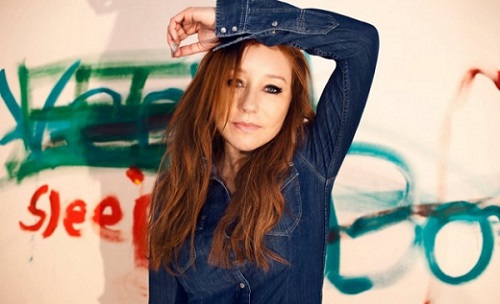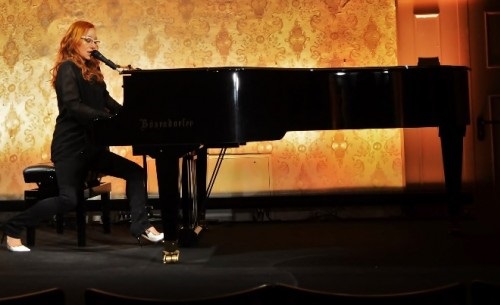|

songs | interviews | photos | tours | boots | press releases | timeline
Nothing But Hope And Passion (www)
nbhap.com
May 12, 2014

Interview: Tori Amos -- 'Do not submit to the projection'
The experiences of being a mother, women and the different aspects of growing older. NOTHING BUT HOPE AND PASSION met the American singer and talked with her about those elementary things.
by Friederike Bloch
When TORI AMOS puts her fingers on the keys of her Bösendorfer, something magical happens. A perfect union, an aura of sensuality, the incarnation of passion. Discovering her love for the piano and her talent for composing as a little girl, TORI AMOS now looks back on an impressive career which includes over a dozen successful albums. Reinventing herself over and over again, she never stopped looking for new ways to express her spiritual worldview and her complex personality. Her latest album Unrepentant Geraldines has just been released via Mercury Classics and is another proof for that.
But the singer is not only an artist but also a mother. With NOTHING BUT HOPE AND PASSION she shared her thoughts about motherhood, women in our society and the power of age.

On your new record 'Unrepentant Geraldines' there is the song 'Promise' which is a beautiful duet with your thirteen-year-old daughter Tash. Did you ask her to sing or did she approach you?
I asked her. We talked about relationships with daughters and mothers and we thought about what kind of promise we could make to each other. That was the beginning.
So the conversation in the song is not a real one you had but rather a collection of your ideas?
Yes. We were also talking about what effect it has when a grown-up tries to tell a teenager the answer to everything. It doesn't go down very well because they have to find the answer on their own.
Grown-ups can see the potential emotional car crashes that happen because of certain decisions -- they have done it as well. So me and my daughter wondered how we can get to a place where the awareness of these potential consequences can be brought up without the parent ordering the teenager around and without that typical teenage tone.
I can totally see that. My mother used to say 'don't speak to me in that tone of voice!'
The walls come up. The verbal bombs are dropped. Nevertheless me and my daughter have a really good relationship. She is in boarding school so I am not the one that she is dealing with all the time.
Recently I spoke with CONOR OBERST about the relation between freedom and love. I think as a parent you have to deal with those things as well. You want to protect your child but you have to give it the freedom to explore the world on its own, which includes bad experiences sometimes. Is there a strategy to keep the balance?
The strategy is day to day. By now I'm more mindful how my words are perceived. I have to question myself: When I say something, what am I really saying? What is my agenda? When I'm saying 'Oh, that is a really great short skirt. Would be great for the beach -- you know, we are going to the ballet tonight', what am I saying? It is loaded, isn't it? She will say 'mom, why didn't you just say that you don't want me to wear this skirt to go to ballet? Let's have the conversation -- no flowery poetry, okay?'
Another topic on 'Unrepentant Geraldines' is age. You turned 50 last year and I read you said that there were some people who helped you see it in a different way. Was it like a magic number or a symbolic middle that has marked a point where you started becoming retrospective instead of looking to the future?
It was both. There were Rae Smith, the stage designer of The Light Princess (editor's note: musical with music and lyrics by TORI AMOS), Paulie Constable, the lighting designer, and Marianne Elliott, the director. They collected all the creations that we had done individually and made the scenery. So in life you take all of your creations and you make it part of your shape. That is what you are and it's not just your outward appearance. You collect that to get to 50 and then you are able to make all kinds of shapes for the next forty years, if you are able to create that long. It's a different way to approach age. It's finding the power of it. Because it's very easy to get caught up in society's projection of what 50 looks like.
I think that women from the age of 40 up aren't visible enough in the media and therefore 'disappear' from society as well. Of course we have to blame those who are responsible for the pictures we see everyday. But how can women themselves contribute to not disappear?
We have to find a way to not submit to the projection. Actors around 50, like Johnny Depp or Daniel Craig, are stepping into the best roles of their lives and a lot of young people find those men sexy. Wisdom and the power of age are aphrodisiacs. Women of the same age are not necessarily seen as sexy. We define women as sexy, unless you're Helen Mirren, if they have a certain body type and a certain age. So we've got to break something in our culture. We have to find wisdom in other women attractive as well, we should value it and we have to find sensuality by what a woman is able to think and to inspire. I don't mean it as a sexual response but as an attractive. Women have to accept their age. If we are not accepting, then how can we expect anybody else?
If a fairy would have appeared at the birth of your daughter and would have said 'I can give her either passion or hope as a present' -- what would you have chosen?
Passion. I think if you have the fire of passion, then of course you have hope.
[source]
t o r i p h o r i a
tori amos digital archive
yessaid.com
|